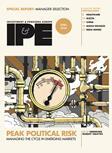Pension funds and other institutional investors say the UK government’s planned legislation forcing companies to report on their climate impact falls short on several counts, according to groups representing them.
One of their main complaints about the proposal by the Department for Business, Energy & Industrial Strategy (BEIS) for mandatory climate-related financial disclosures by listed and large private firms, as well as LLPs, is that the rules are not rigorous enough to inform the climate reporting that investors in these companies are themselves obliged to do.
Fiona Reynolds, chief executive officer of the PRI, said: “The proposal for consultation set forth by BEIS on corporate disclosure are out of step with other reforms on climate-related financial disclosures and critically – would water down, rather than implement, the TCFD [Task Force on Climate-related Financial Disclosures] framework.”
A step-change in the quality and quantity of corporate reporting was urgently needed by investors to provide “decision-useful” information on how companies are positioning themselves in the net-zero transition, she said.
The PRI said the proposals would undermine the quality and comparability of UK corporate climate-related disclosures, diverging from what had become an established industry baseline by requiring corporate disclosure on the four pillars of the TCFD, rather than the task force’s actual 11 recommendations.
In its response to the consultation, which closed on 5 May, the Pensions and Lifetime Savings Association (PLSA) said the proposal was a step in the right direction.
“However, we would hope that the government will take steps to bring equivalence of reporting requirements across the investment chain, including introducing statutory requirements on metrics and targets for companies, to ensure that institutional investors can assess their approach to tackling the climate crisis, and fulfil their own regulatory obligations fully,” it said.
The lobby group said the regulation should be enforced as soon as the parliamentary calendar allowed.
“The timings proposed in this document mean that many of the companies it applies to will not be required to report under after the 2022 timeframe as set out in the ‘Roadmap to Mandatory TCFD Disclosures’,” it said.

The PLSA called for the requirements to extend to all premium and standard listed companies as well.
“Not only are many pension funds invested in these companies (so are therefore somewhat dependent on this to meet their own disclosure requirements), but we believe that climate change is a material factor,” the group wrote.
It also said it was disappointed the government was proposing that scenario analysis testing was “encouraged but not required”, due to a skills and expertise gap.
Meanwhile, the Investment Association (IA) told the BEIS that the proposals had to provide consistency and comparability and be “at the right level of granularity” to enable investment managers and asset owners to meet their own reporting requirements.
It asked the government to strengthen the requirements in several ways.
They should ensure disclosures on climate metrics and targets were provided at the subsidiary level, the IA said, and that they were aligned with all 11 recommendations of TCFD.
Scenario analysis should also be added as a requirement, as well as mandatory disclosure of material Scope 3 emissions data under Streamlined Energy and Carbon Reporting requirements, the association said in the response.
The qualification in the proposal that companies only had to comply if they considered climate-related disclosures to be material should be removed, it said.
“Without the removal of this qualification, we are concerned that some companies won’t take necessary steps to assess the impact of climate risks on their business model and strategy,” the association said.
Separately, the Institutional Investors Group on Climate Change (IIGCC) included many of the same criticisms in its consultation response.
“A wider scope of companies should be required to disclose against the TCFD recommendations, and at a more granular level of detail, in order to support investors’ assessments of climate-related risks and opportunities,” it said.
The IIGCC also bemoaned the proposal not to require a scenario analysis from firms, saying: “Scenario analysis is an essential tool to support investors and wider stakeholders in understanding the vulnerability of individual companies to transition and physical risks, and how companies are managing these risks”.
It supported the plan for disclosures to be made at group level, with the proviso that appropriate safeguards be introduced for the sake of transparency around material climate-related risks which subsidiaries might be exposed to.
Looking for IPE’s latest magazine? Read the digital edition here.
Topics
- Asset Managers
- Climate change
- climate reporting
- Corporate governance
- ESG
- Institutional Investors Group on Climate Change (IIGCC)
- Legislation
- Pensions and Lifetime Savings Association (PLSA)
- Principles for Responsible Investment (PRI)
- Reform & Regulation
- reporting
- Taskforce on Climate-related Financial Disclosures (TCFD)
- The Investment Association
- United Kingdom












No comments yet